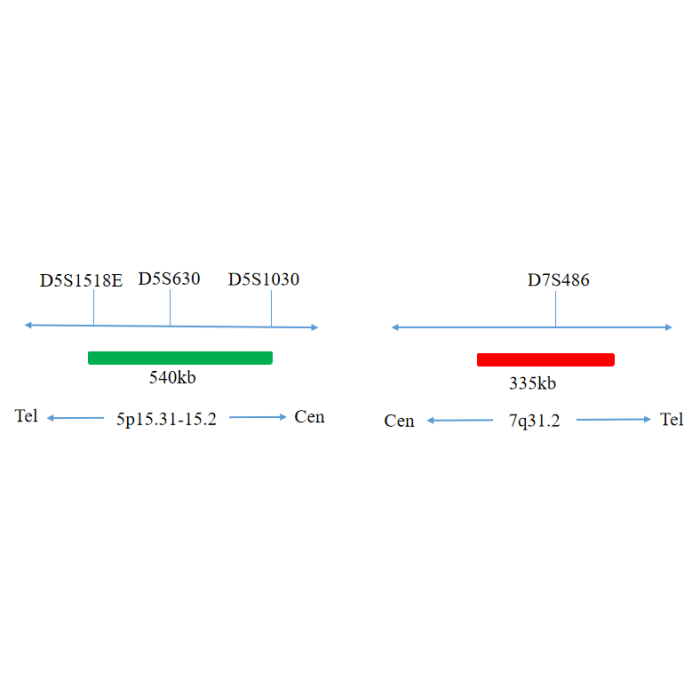MDS chromosome and gene anomaly detection probe (EGR1/D5S630)
MDS (EGR1/D5S630) Chromosome and Gene Anomaly Probe Detection Kit - 100µL/10 Tests
Myelodysplastic syndrome (MDS) is a group of heterogeneous diseases that are generally considered to originate from hematopoietic stem cells and belong to malignant clonal diseases. Studies have shown that 40% to 60% of patients with MDS have non-randomized chromosomal anomalies, of which - the most common are 5/5q-, -7/7q-, +8, 20q-, and -Y.
Among the common chromosomal anomalies in patients with MDS, some chromosomal anomalies have specific diagnostic value. Immunosuppressive therapy is effective in some patients with simple +8, 20q-, or Y-; karyotype analysis also has important value in the classification, treatment, and prognosis of MDS, such as single Y-, 5q- or 20q- patients’ have a good prognosis, while patients with complex chromosomal anomalies (≥3 anomalies) or chromosome 7 anomalies have a poorer prognosis. Patients with other anomalies have a moderate prognosis. These anomalies are of great significance in the diagnosis, treatment, and prognosis of MDS.
Product Main Components
The kit consists of EGR1/D5S630 dual color probe
|
Component name |
Specifications |
Quantity |
Main components |
|
EGR1/D5S630 dual color probe |
100μL/Tube |
1 |
D7S522 orange probe, CEP7 green probe |
Intended Use
This kit uses fluorescence in situ hybridization to detect the absence/deletion of chromosomes 5, 7, 20 long arm and chromosomes 5, 7, 8, Y chromosomal anomalies in patients with myelodysplastic syndrome. The test sample is bone marrow cells. Myelodysplastic syndrome (MDS) is a group of heterogeneous diseases that are generally considered to originate from hematopoietic stem cells and belong to malignant clonal diseases. Studies have shown that 40% to 60% of patients with MDS have non-randomized chromosomal anomalies, of which - the most common are 5/5q-, -7/7q-, +8, 20q-, and -Y. Among the common chromosomal anomalies in patients with MDS, some chromosomal anomalies have specific diagnostic value.
Immunosuppressive therapy is effective in some patients with simple +8, 20q-, or Y-; karyotype analysis also has important value in the classification, treatment, and prognosis of MDS, such as single Y-, 5q- or 20q- patients’ have a good prognosis, while patients with complex chromosomal anomalies (≥3 anomalies) or chromosome 7 anomalies have a poorer prognosis. Patients with other anomalies have a moderate prognosis. These anomalies are of great significance in the diagnosis, treatment, and prognosis of MDS. This kit was not clinically combined with gene targeting therapy, and was validated only for the performance of gene detection. This kit is only suitable for the detection of myelodysplastic syndromes and provides physicians with supplementary diagnostic information.
Detection Principle
Fluorescence in situ hybridization is a technique that directly observes specific nucleic acids in cells in vitro. According to the principle of base pairing, the specific DNA sequence is complementary to the target sequence in the cell. Since the probe is fluorescent, the hybridization probe and the target DNA can be clearly observed under the fluorescence microscope due to the fluorescence of the probe under the appropriate excitation light.
This kit uses orange fluorescent markers CSF1R, EGR1, D7S486, D7S522, D20S108, CEPX, and CEPY probes. The D5S630, CEP7, CEP8, CEPX, Yq12 probes are labeled with green fluorescence and the probes are bound to the target detection site by in situ hybridization. Under normal conditions (no gene deletions and chromosomal anomalies), two orange-red signals and two green signals are shown under a fluorescence microscope. When there is a deletion of a gene, a green or orange signal is lacking, and when there are multiple chromosomes, the probe signal increases. Detection of gene deletions and chromosomal abnormalities by this method is of great importance in the diagnosis, treatment, and prognosis of MDS.

